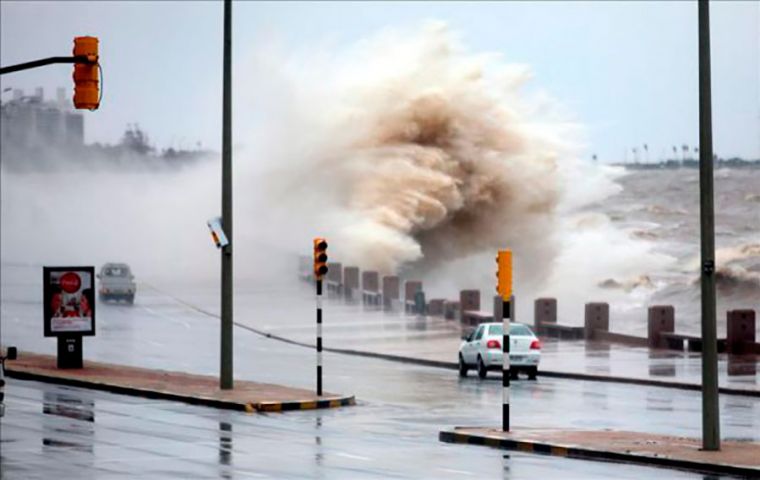MercoPress. South Atlantic News Agency
Uruguay takes action as climate change threatens waters will advance on coastline
 Coastal cities will be flooded due to climate change if no measures are implemented
Coastal cities will be flooded due to climate change if no measures are implemented Uruguay's Environment Ministry has launched the National Climate Change Adaptation Plan for the Coastal Zone (PAN Costas) to increase resilience to a rise in the level of the sea, resulting from climate change.
The program encompasses the municipalities of Montevideo, Canelones, Maldonado, Colonia, Rocha, and San José, it was announced. Tenders will be invited in June for projects in each of these departments.
Upon launching the project, Environment Minister Adrián Peña pointed out that 70% of Uruguay's population lives in coastal areas and stressed that “climate change affects everyone, but particularly the most vulnerable.”
During the announcement, Uruguayan authorities grounded their initiative on projections for the next 80 years showing how water will gain ground along the coastline if no measures are taken.
“This plan will allow us to implement adaptation measures that minimize future damages and incorporate the social dimension that addresses the needs of those most affected,” said Peña.
Also participating in the event Tuesday were Climate Change Director Natalie Pareja; PAN Costas Coordinator Mónica Gómez; Uruguayan Cooperation Agency Executive Director Mariano Berro; European Union (EU) Ambassador in Uruguay, Paolo Berizzi; and Spain's Ambassador in Montevideo José Javier Gómez-Llera y García-Nava.
The presence of foreign dignitaries was due to the fact that the measures to combat climate change in Uruguay's coastal areas are financed by the EU's Euroclima+ and the Spanish Agency for International Development Cooperation.
Images of the coastal cities of La Paloma, Piriápolis, Atlántida, and Colonia del Sacramento were shown, and how their flooding is projected for the next 100 years.
The PAN Costas measures are divided into three categories: social, physical structures, and institutional. The first group includes the generation of information and communication with society. The second group includes engineering works and impact management. Among the institutional measures are policies and programs, and joint work with the different municipalities.
Coordinator Gómez is to meet with local authorities at each municipality to discuss each jurisdiction's particular needs and requirements. Six projects will result, for which a call for bids will be made in June.
The advance of the sea is already under monitoring through satellite images, video cameras placed along the coasts, and citizen watch, which consists of private citizens taking pictures and sharing them with PAN Costas teams for comparison.




Top Comments
Disclaimer & comment rulesCommenting for this story is now closed.
If you have a Facebook account, become a fan and comment on our Facebook Page!